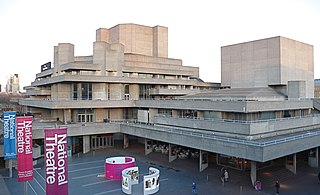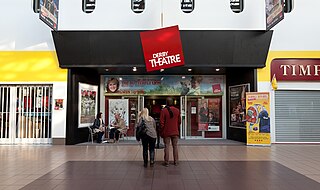Related Research Articles

The National Theatre (NT), officially the Royal National Theatre and sometimes referred to in international contexts as the National Theatre of Great Britain, is a performing arts venue and associated theatre company located in London, England. The theatre was founded by Laurence Olivier in 1963 and many well-known actors have since performed with it.

Stephen David Daldry CBE is an English director and producer of film, theatre, and television. He has won three Tony Awards for his work on Broadway and an Olivier Award for his work in the West End. He has received three Academy Awards nominations for Best Director, for the films Billy Elliot (2000), The Hours (2002), and The Reader (2008).

James Elliot Lapine is an American stage director, playwright, screenwriter, and librettist. He has won the Tony Award for Best Book of a Musical three times, for Into the Woods, Falsettos, and Passion. He has frequently collaborated with Stephen Sondheim and William Finn.

Bristol Old Vic is a British theatre company based at the Theatre Royal, Bristol. The present company was established in 1946 as an offshoot of the Old Vic in London. It is associated with the Bristol Old Vic Theatre School, which became a financially independent organisation in the 1990s. Bristol Old Vic runs a Young Company for those aged 7–25.
Stephen Lowe is an English playwright and director.
Jeffery Kissoon is an actor with credits in British theatre, television, film and radio. He has performed with the Royal Shakespeare Company at venues such as the Royal National Theatre, under directors including Peter Brook, Peter Hall, Robert Lepage, Janet Suzman, Calixto Bieito and Nicholas Hytner. He has acted in genres from Shakespeare and modern theatre to television drama and science fiction, playing a range of both leading and supporting roles, from Mark Antony in Antony and Cleopatra and Prospero and Caliban in The Tempest, to Malcolm X in The Meeting and Mr Kennedy in the children's TV series Grange Hill.
John Doyle is a Scottish stage director of musicals and plays, as well as operas. He served as artistic director at several regional theatres in the United Kingdom, where he staged more than 200 professional productions during his career spanning over 40 years.

Mountview Academy of Theatre Arts, formerly Mountview Theatre School, is a drama school in Peckham, south London, England, founded in 1945. Mountview Academy provides specialist vocational training in acting, musical theatre and actor musicianship, as well as production arts and theatre creative practices. The President of the school is Dame Judi Dench, and the Principal is Sally Ann Gritton.

The Bradford Playhouse is a 266-seat proscenium arch theatre with circle and stall seating based in Little Germany, in the city of Bradford, West Yorkshire, England. Formerly known as The Priestley, the theatre also has a studio space that has flexible lighting, sound and seating arrangements.
ATG Entertainment, formerly The Ambassador Theatre Group (ATG), is a major international live entertainment organisation headquartered in the United Kingdom, with offices in Woking, London, New York, Sydney, Mannheim and Cologne. ATG's key operations comprise three inter-related activities: venue ownership and management, ticketing and marketing operations, and show productions.

Derby Theatre is a theatre situated in Derby, England, located within the Derbion shopping centre. Formerly known as the Derby Playhouse, it was owned and run by Derby Playhouse Ltd from its opening in 1975 until 2008, when the company ceased operating after a period in administration. The theatre was reopened in 2009 as the Derby Theatre under the ownership of the University of Derby, who use it as a professional and learning theatre. In addition to the 531 seat main auditorium, the building contains a 110-seat studio theatre.
The following is a chronological list of productions staged at the Derby Playhouse from 1975 to 2008. The Derby Playhouse was a theatre production company and the former name of the theatre which it owned and operated from its opening in 1975 until 2008, when the company ceased operating after a period in administration. Situated in Derby, England, the theatre is now known as the Derby Theatre and has been owned and operated by the University of Derby since 2009.

Salisbury Playhouse is a theatre in the English city of Salisbury, Wiltshire. Built in 1976, it comprises the 517-seat Main House and the 149-seat Salberg Studio, a rehearsal room, a daytime café, and a community and education space. It is part of Arts Council England's National Portfolio of Organisations, and also receives regular funding from Wiltshire Council and Salisbury City Council.
Alice Nutter is an English musician, best known as part of the anarchist music group Chumbawamba, and writer for theatre, radio and television.

The Mercury Theatre is a theatre in Colchester, producing highly regarded original work under the title "Mercury Productions" and also receiving touring shows. The theatre has two auditoria, and is led by Steve Mannix. The theatre also contains The Digby Gallery, which showcases local art.

Derby Gilbert & Sullivan Company, based in Derby, England, produced the works of Gilbert and Sullivan from 1966 to 2018. The company won the amateur competition at the International Gilbert and Sullivan Festival an unprecedented six times and was called "one of the most highly acclaimed nonprofessional theatre companies in the UK". The company also won awards from the Waterford International Festival of Light Opera.
Esther Richardson is a British theatre director and script editor. She directed an adaptation of Stephen Poliakoff's Breaking the Silence, and A Pair of Pinters. In 2016, she was appointed the artistic director of Pilot Theatre.
Ann "Annie" Castledine, was a British theatre director, teacher and dramaturg.

Carolina Actors Studio Theatre (CAST) was an independent non-profit theatre company located at 2424 North Davidson Street in Charlotte, North Carolina. It was founded in 1992 by Charlotte acting instructor Ed Gilweit as an actor's teaching school. In 2000 Gilweit's company partnered with a video and stage production company run by Michael Simmons called Victory Pictures, Inc., and then with the fledgling theatre group Another Roadside Performance Company run by Robert Lee Simmons, Michael Simmons' son. Through this series of mergers, Gilweit and the Simmons' became the founders of the Carolina Actors Studio Theatre. After Gilweit's death in 2002, Michael Simmons became the Managing Artistic Director.

Martin David Anson Duncan is an English director, actor, composer, and choreographer. Duncan was artistic director of Nottingham Playhouse from 1994 to 1999 and joint artistic director of Chichester Festival Theatre from 2003 to 2005 with Ruth Mackenzie and Steven Pimlott. He has composed the musical scores for over 50 theatre productions.
References
- ↑ Derby Telegraph (1 April 2013)."Heckling from the amateurs in early days of forerunner to Playhouse" Retrieved 4 April 2013.
- ↑ Powers, Jonathan. "A near-perfect start to events on the stage at Little Theatre". Derby Telegraph. Archived from the original on 5 May 2013. Retrieved 15 April 2013.
- ↑ Powers, Jonathan. "How Playhouse arose from the Little Theatre with some very big ambitions". Derby Telegraph. Archived from the original on 5 May 2013. Retrieved 15 April 2013.
- ↑ Derby Telegraph (5 November 2009). "107 years young, Reg still on song thanks to faith, laughter and gin!". Retrieved 10 January 2013.
- ↑ Powers, Jonathan (22 April 2013). "How Playhouse was reborn after rejecting Osborne and being burnt to the ground". Derby Telegraph. Archived from the original on 5 May 2013. Retrieved 22 April 2013.
- ↑ Powers, Jonathan (29 April 2013). "From humble beginnings of weekly rep to a theatre full of stage stars". Derby Telegraph. Archived from the original on 5 May 2013. Retrieved 30 April 2013.
- ↑ Powers, Jonathan (6 May 2013). "UK economy in meltdown was major problem for Playhouse project in 70s". Derby Telegraph. Archived from the original on 7 July 2013. Retrieved 6 May 2013.
- ↑ Picturethepast.org.uk and Derby Telegraph . "Derby Playhouse entrance". Retrieved 14 January 2013.
- 1 2 3 BBC News. (20 September 2005). "Replacement for Playhouse urged". Retrieved 10 January 2013.
- 1 2 Orme, Steve (2004). "Karen Hebden – Rescuing Derby" Archived 4 March 2016 at the Wayback Machine . British Theatre Guide. Retrieved 10 January 2013.
- ↑ Martin, Francesca (5 December 2007). "Derby Playhouse closes its doors after council refuses pleas for emergency funds". The Guardian . Retrieved 10 January 2013.
- ↑ Atkins, Tom (30 November 2007). "Board Shuts Derby Playhouse, Cancels Xmas Show" Archived 16 December 2009 at the Wayback Machine . Whatsonstage. Retrieved 10 January 2013.
- ↑ Ashworth, Pat (3 December 2007). "Dark times for Derby Playhouse as board closes theatre". The Stage . Retrieved 10 January 2013.
- 1 2 Derby Telegraph (13 September 2008). "Abridged Version Of Playhouse Drama" Archived 5 May 2013 at archive.today . Retrieved 10 January 2013.
- ↑ Orme, Steve (December 2007). "Review: Treasure Island, Robert Louis Stevenson, adapted by Karen Louise Hebden, Derby Playhouse. British Theatre Guide. Retrieved 10 January 2013.
- ↑ Derby Telegraph (30 July 2008). Playhouse-board-given-ahead-reopen-theatre "Playhouse board given go-ahead to reopen theatre". Retrieved 10 January 2013.
- ↑ Derby Telegraph (15 September 2008). "Playhouse reopening proves it can thrive with fans' support". Retrieved 10 January 2013.
- ↑ Derby Telegraph (8 October 2009). "Theatre stages a remarkable comeback" Archived 19 September 2012 at archive.today . Retrieved 10 January 2013.
- ↑ Powers, Jonathan (13 May 2013). "Plaudits for the city's new Playhouse on its first night but funds were issue from start". Derby Telegraph. Archived from the original on 7 July 2013. Retrieved 13 May 2013.
- ↑ Derby Telegraph (5 April 2011). "Author's free play offer to help theatre" Archived 24 August 2020 at the Wayback Machine . Retrieved 13 January 2013.
- ↑ Derby Telegraph (2 November 2007). "Studio Demise Is Bemoaned". (subscription required).
- 1 2 Gardner, Lyn (4 April 2001). "The power behind the scenes". The Guardian . Retrieved 13 January 2013.
- ↑ Giannachi, Gabriella and Luckhurst, Mary (1999). On Directing: Interviews with Directors, p. 7. Palgrave Macmillan. ISBN 0312224834
- ↑ Morrison. James (2011). Essential Public Affairs for Journalists, p. 572. Oxford University Press. ISBN 0199592004
- ↑ Theatrical Management Association. Previous Awards Archived 3 December 2013 at the Wayback Machine . Retrieved 11 January 2013.
- ↑ Derby Telegraph (27 January 2010). "Our favourite playwright returns to the city stage". Retrieved 13 January 2013.
- ↑ Milwaukee Repertory Theater. "Mark Clements" Archived 4 April 2013 at the Wayback Machine . Retrieved 13 January 2013.
- ↑ Powlson, Nigel (7 February 2012). "Panto favourite Pete is loving life back on the theatre stage". Derby Telegraph Retrieved 13 January 2013.
- ↑ Orme, Steve (September 2002). British Theatre Guide "Review: Arsenic and Old Lace, Derby Playhouse". British Theatre Guide. Retrieved 11 January 2013.
- ↑ Gardner, Lyn (7 December 2007). "Derby Playhouse's last leg". Retrieved 14 January 2013.
- ↑ Theatrical Management Association. TMA Theatre Awards Winners & Nominees 2008 Archived 12 November 2010 at the Wayback Machine . Retrieved 11 January 2013.
- ↑ Orme, Steve (30 November 2008). "Derby Playhouse: Future Settled in Two Weeks?" Archived 12 November 2012 at the Wayback Machine . British Theatre Guide. Retrieved 11 January 2013.